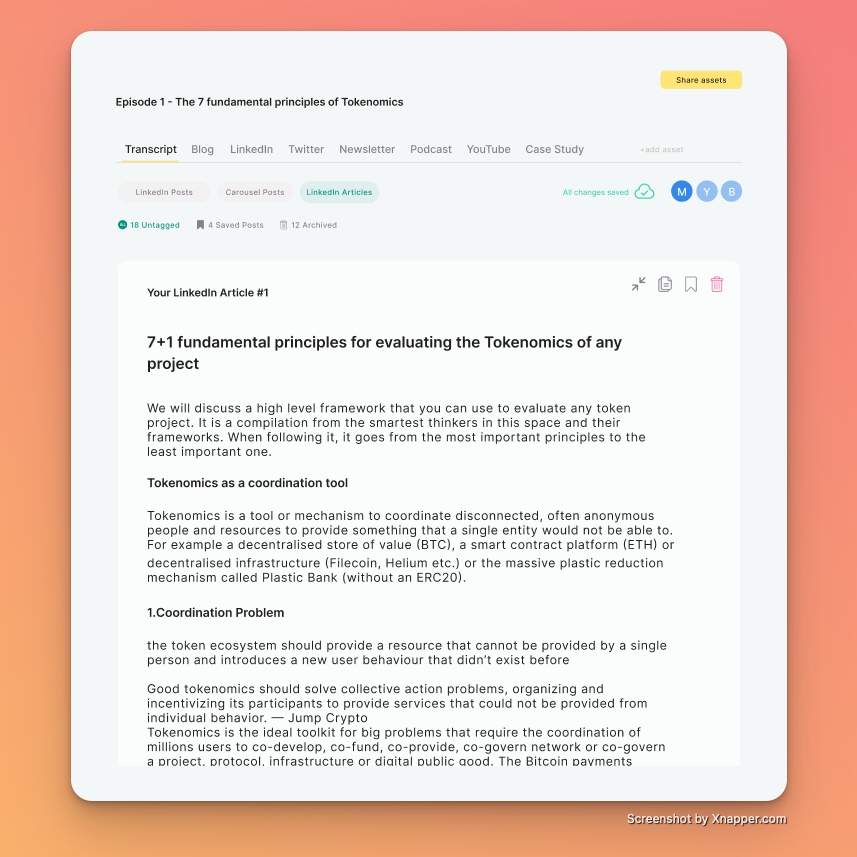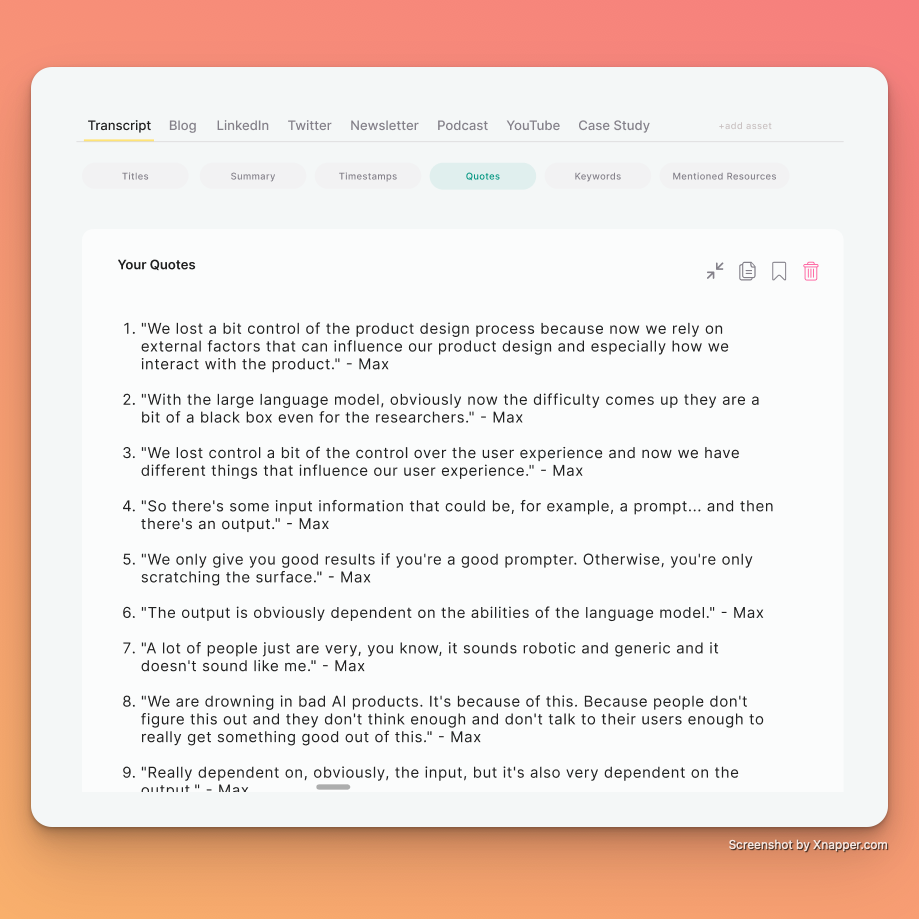Crime Podcast Name Ideas
100 Crime Podcast Name Ideas
Framework 1: Niche-Specific Keywords
Incorporate niche-specific keywords that clearly define what your channel is about. This ensures that your channel’s purpose is immediately apparent to viewers.
Steps:
1. Identify the core subject of your channel (e.g., True Crime, Cold Cases, Criminal Psychology).
2. List relevant keywords related to the subject.
3. Combine keywords to create a clear and descriptive name.
Examples:
– True Crime + Chronicles = True Crime Chronicles
– Cold Cases + Files = Cold Case Files
– Criminal Psychology + Insights = Criminal Psychology Insights
– Crime Stories + Investigated = Crime Stories Investigated
– Forensic + Tales = Forensic Tales
Framework 2: Unique Value Proposition
Highlight what makes your channel unique or the specific value it provides, such as a particular teaching style, exclusive content, or a unique approach. This sets your channel apart from others in the same niche.
Steps:
1. Determine what unique aspect your channel offers (e.g., In-Depth Analysis, Rare Interviews, Historical Context).
2. Think of words that describe this unique value.
3. Combine these descriptive words with your subject matter.
Examples:
– In-Depth Analysis + Crime = Crime Analysis Central
– Rare Interviews + Crime = Rare Crime Interviews
– Historical Context + Murders = Historic Murder Mysteries
– Psychological Insights + Criminals = Criminal Minds Uncovered
– Unique Cases + Crime = Crime Curiosities
Framework 3: Audience-Focused Naming
Create names that directly address the audience or their goals, making the channel more relatable and appealing to potential viewers.
Steps:
1. Identify your target audience (e.g., True Crime Enthusiasts, Aspiring Detectives, Mystery Lovers).
2. List the goals or challenges of your audience (e.g., Solving Mysteries, Understanding Criminal Minds, Uncover Hidden Facts).
3. Combine these elements into a name that speaks directly to your audience.
Examples:
– True Crime Enthusiasts + Lounge = True Crime Enthusiasts Lounge
– Aspiring Detectives + Academy = Detective Academy
– Mystery Lovers + Hub = Mystery Lovers Hub
– Crime Solvers + Network = Crime Solvers Network
– Forensic Fans + Insights = Forensic Fans Insights
Framework 4: Creative and Catchy
Use creative, catchy, and memorable words or phrases that are easy to remember and stand out from the competition.
Steps:
1. Brainstorm fun and catchy words related to your niche.
2. Think about phrases or combinations that are easy to remember.
3. Mix and match words until you find a combination that stands out.
Examples:
– Crime + Busters = Crime Busters
– Dark + Chronicles = Dark Chronicles
– Mystery + Junkies = Mystery Junkies
– Cold + Whodunits = Cold Whodunits
– Crime + Pulse = Crime Pulse
Framework 5: Authority and Expertise
Position your channel as an authority in the field by using names that convey expertise and professionalism, building trust with the audience.
Steps:
1. Identify words that convey authority and expertise (e.g., Expert, Specialist, Master).
2. Combine these words with your subject matter to create a name that suggests professionalism.
3. Ensure the name reflects the credibility of your content.
Examples:
– Crime + Expert = Crime Expert Podcast
– Forensic + Authority = Forensic Authority Channel
– Criminal Psychology + Specialist = Criminal Psychology Specialist
– True Crime + Master = True Crime MasterClass
– Crime Scene + Pro = Crime Scene Pro
Framework 1: Word Play and Puns
Use clever wordplay, puns, or alliteration to create a fun and memorable channel name. This approach can make your channel name catchy and engaging.
Steps:
1. Identify key themes or subjects of your channel (e.g., Crime, Mystery, Investigation).
2. Brainstorm puns or playful phrases related to these themes.
3. Combine words creatively to make the name fun and memorable.
Examples:
– Crime + Pun = Crime & Punishment
– Mystery + Pun = Mysteri-Yes!
– Investigation + Pun = Crime Scene Sleuths
– Crime + Pun = Crime Time
– Mystery + Pun = Whodunit Wonders
Framework 2: Problem-Solution Naming
Focus on the problem your channel solves or the benefit it provides. This approach makes it clear to viewers what they can expect from your channel.
Steps:
1. Identify common problems or challenges your audience faces (e.g., Unsolved Cases, Lack of Information, Curiosity).
2. Highlight the solution or benefit your channel offers.
3. Combine these elements into a name that addresses the problem and solution.
Examples:
– Unsolved Cases + Solution = Solved Mysteries
– Lack of Information + Solution = Crime Clarity
– Curiosity + Solution = Curiosity Crimes
– Unsolved Cases + Solution = Case Closed
– Lack of Information + Solution = Detective Insights
Framework 3: Descriptive and Direct
Use straightforward and descriptive words to clearly communicate the channel’s focus. This makes it easy for viewers to understand what your channel is about at a glance.
Steps:
1. Identify the main focus or subject of your channel (e.g., True Crime, Cold Cases, Criminal Psychology).
2. Use direct and descriptive words related to this focus.
3. Combine these words to create a clear and informative name.
Examples:
– True Crime + Description = True Crime Chronicles
– Cold Cases + Description = Cold Case Files
– Criminal Psychology + Description = Criminal Minds Uncovered
– True Crime + Description = True Crime Tales
– Cold Cases + Description = Cold Case Investigations
Framework 4: Personal Branding
Incorporate your name or a personal brand element into the channel name to create a personal connection with your audience. This can make your channel feel more approachable and unique.
Steps:
1. Decide if you want to use your name, nickname, or a brand element (e.g., Name, Nickname, Brand Element).
2. Think of ways to combine this personal element with your channel’s focus.
3. Create a name that feels personal and relatable.
Examples:
– Name + Focus = Detective John’s Crime Stories
– Nickname + Focus = Sleuth Sally’s Mysteries
– Brand Element + Focus = CrimeScene with Chris
– Name + Topic = Investigator Jane’s Cases
– Nickname + Topic = Private Eye Paul’s Podcast
Framework 5: Inspirational and Motivational
Use words that inspire or motivate your audience. This approach can create a positive and uplifting association with your channel.
Steps:
1. Identify the inspirational or motivational themes related to your content (e.g., Justice, Truth, Resolution).
2. Choose words that evoke these themes.
3. Combine these words to create an uplifting and inspiring name.
Examples:
– Justice + Word = Justice Journey
– Truth + Word = Truth Seekers
– Resolution + Word = Resolution Radio
– Justice + Word = Justice Uncovered
– Truth + Word = Truth Chronicles
Framework 1: Acronyms and Abbreviations
Use acronyms or abbreviations to create a concise and memorable channel name. This can make the name easy to remember and quick to type.
Steps:
1. Identify key phrases or terms related to your channel (e.g., True Crime, Cold Cases, Crime Stories).
2. Create acronyms or abbreviations from these phrases.
3. Ensure the acronym or abbreviation is easy to pronounce and remember.
Examples:
– True Crime = TC
– Cold Cases = CC
– Crime Stories = CS
– Criminal Investigation = CI
– Forensic Files = FF
Framework 2: Trendy and Modern
Incorporate trendy or modern terms and slang to appeal to a contemporary audience. This approach can make your channel seem current and relevant.
Steps:
1. Identify modern terms, slang, or trends related to your niche (e.g., Unsolved, Deep Dive, Sleuth).
2. Combine these trendy terms with relevant keywords.
3. Ensure the name resonates with current trends and is easy to understand.
Examples:
– Unsolved + Mysteries = Unsolved Mysteries
– Deep Dive + Crimes = Deep Dive Crimes
– Sleuth + Stories = Sleuth Stories
– Dark + Crimes = Dark Crimes
– Crime + Chasers = Crime Chasers
Framework 3: Geographic and Local
Use geographic locations or local references to create a sense of community and relevance. This can be particularly effective if your content has a local focus.
Steps:
1. Identify relevant geographic locations or local terms (e.g., City Name, Famous Street, Landmark).
2. Combine these locations with relevant keywords or subjects.
3. Ensure the name reflects the local or geographic focus.
Examples:
– New York + Crimes = New York Crimes
– Chicago + Cold Cases = Chicago Cold Cases
– Hollywood + Mysteries = Hollywood Mysteries
– Texas + Crime Stories = Texas Crime Stories
– London + Criminals = London Criminals
Framework 4: Historical and Cultural References
Incorporate historical events, figures, or cultural references to give your channel a unique and interesting twist. This can appeal to viewers with specific interests in these areas.
Steps:
1. Identify historical events, figures, or cultural references related to your content (e.g., Jack the Ripper, Al Capone, Prohibition).
2. Combine these references with relevant keywords or subjects.
3. Ensure the name evokes the historical or cultural context.
Examples:
– Jack the Ripper + Chronicles = Jack the Ripper Chronicles
– Al Capone + Files = Al Capone Files
– Prohibition + Crimes = Prohibition Crimes
– Sherlock Holmes + Mysteries = Sherlock Holmes Mysteries
– Bonnie and Clyde + Stories = Bonnie and Clyde Stories
Framework 5: Emotional Appeal
Use words that evoke strong emotions or feelings to create a deep connection with your audience. This approach can make your channel name more memorable and impactful.
Steps:
1. Identify emotions or feelings you want to evoke (e.g., Fear, Intrigue, Suspense).
2. Choose words that are strongly associated with these emotions.
3. Combine these emotional words with relevant keywords or subjects.
Examples:
– Fear + Files = Fear Files
– Intrigue + Investigations = Intrigue Investigations
– Suspense + Stories = Suspense Stories
– Terror + Tales = Terror Tales
– Mystery + Murders = Mystery Murders
Framework 1: Questions and Curiosity
Use questions or phrases that evoke curiosity to engage potential viewers. This approach makes people want to find out more about your channel.
Steps:
1. Identify intriguing questions or curiosity-inducing phrases related to your content (e.g., Who Did It?, Why Did It Happen?, What’s the Motif?).
2. Combine these questions with relevant keywords or subjects.
3. Ensure the name piques curiosity and invites exploration.
Examples:
– Who Did It? + Crime = Who Did It Crimecast
– Why Did It Happen? + Mystery = Why Did It Happen Mysteries
– What’s the Motif? + Case = What’s the Motif Case Files
– How Could It Be? + Crime = How Could It Be Crime Stories
– Where’s the Evidence? + Podcast = Where’s the Evidence Podcast
Framework 2: Action-Oriented Names
Use action verbs to create a sense of dynamism and activity. This can make your channel name exciting and suggest active engagement.
Steps:
1. Identify action verbs related to your content (e.g., Investigate, Solve, Uncover).
2. Combine these verbs with relevant keywords or subjects.
3. Ensure the name conveys energy and action.
Examples:
– Investigate + Crime = Investigate Crimes
– Solve + Mystery = Solve Mysteries Now
– Uncover + Cases = Uncover Cold Cases
– Track + Evidence = Track the Evidence
– Expose + Truth = Expose the Truth
Framework 3: Playful and Fun
Use playful and fun words to create a lighthearted and enjoyable channel name. This approach can make your channel seem approachable and entertaining.
Steps:
1. Identify playful and fun words related to your niche (e.g., Sleuth, Whodunnit, Crime Time).
2. Combine these words with relevant keywords or subjects.
3. Ensure the name is enjoyable and easy to remember.
Examples:
– Sleuth + Stories = Sleuth Stories
– Whodunnit + Mysteries = Whodunnit Mysteries
– Crime Time + Podcast = Crime Time Podcast
– Detective + Fun = Detective Fun Hour
– Clue + Chronicles = Clue Chronicles
Framework 4: Hybrid Names
Combine two different concepts or words to create a unique and memorable name. This can set your channel apart with a distinctive and interesting identity.
Steps:
1. Identify two different concepts or words related to your content (e.g., Crime & Coffee, Murder & Mystery).
2. Combine these concepts to create a hybrid name.
3. Ensure the name is unique and reflects the essence of your channel.
Examples:
– Crime + Coffee = Crime & Coffee Chronicles
– Murder + Mystery = Murder & Mystery Files
– Law + Disorder = Law & Disorder Tales
– Clue + Case = ClueCase Stories
– Truth + Trails = Truth Trails Podcast
Framework 5: Numbers and Lists
Use numbers or list-related terms to create a sense of structure and organization. This approach can make your channel seem informative and easy to follow.
Steps:
1. Identify key topics or themes in your content that can be numbered or listed (e.g., Top Crimes, 10 Mysteries).
2. Combine these topics with numbers or list-related terms.
3. Ensure the name suggests clear, organized, and structured content.
Examples:
– Top + Crimes = Top Crimes Podcast
– 10 + Mysteries = 10 Mysteries Uncovered
– 5 + Cold Cases = 5 Cold Cases Solved
– 7 + Crime Stories = 7 Crime Stories
– 3 + True Crime = 3 True Crime Tales
How to choose from the Crime Podcast Name Ideas
Crime Podcast Name Ideas should revolve around invoking a sense of intrigue, mystery, and authority on the subject of criminal cases. Begin by considering elements of true crime stories that captivate your target audience, such as unsolved mysteries, famous heists, or thrilling courtroom dramas. Integrate powerful and evocative words like “Shadow,” “Murder,” “Detective,” or “Cold Case” to create an immediate connection with potential listeners. Additionally, assessing the tone of your podcast is crucial — whether it’s serious and factual or a blend of humor and horror. Use tools like alliteration and puns for a catchy, memorable title, and ensure it’s easy to spell and say aloud for searchability. Research competitor names to avoid unintentional similarities; uniqueness is key to stand out in a saturated market. Finally, test your top choices on friends or social media platforms to gauge their impact before making a final decision, ensuring it resonates with the desired audience and leaves a lasting impression.
Utilizing Crime Podcast Name Ideas can significantly elevate both the creativity and professionalism of your podcast venture. By leveraging this tool, you ensure that your podcast’s title stands out in an increasingly crowded market, capturing the intrigue and curiosity of potential listeners. This advantage translates to enhanced audience engagement and a stronger brand identity, providing a solid foundation for long-term success. Furthermore, the time and effort saved using Crime Podcast Name Ideas can be invested back into content creation and marketing strategies, ultimately leading to a more polished and compelling end product. In a competitive landscape, gaining this edge can be the key to distinguishing your podcast from countless others, making Crime Podcast Name Ideas an indispensable asset for serious podcasters.
Unifire is the most powerful AI Writer for Podcasters
Unifire combines a beautiful AI writer with the best transcription service and content templates for Podcast content. It allows you to easily autogenerate show notes, video descriptions, summaries and titles, extract quotes, and turn your podcasts into blog posts, newsletters and even e-books. Start with Crime Podcast Name Ideas and level up with Unifire.ai
An ultra-powerful AI writer
Summarise, extend, shorten and whatever you can imagine with our powerful AI editor. You can work with your content with maximum efficiency and full collaboration.

32 different output formats
With Unifire, you can turn and repurpose anything into anything. One audio recording can become an e-book, 40 LinkedIn posts, an email newsletter, a lead magnet, or every Twitter asset with one click of a button.

Build for your entire team
Unifire comes with unlimited team members, workspaces, collaborative live editing and double backups for all your content.

Upload any formats you can imagine
You can feed Unifire audio recordings, videos, webinars, transcripts, documents and PDFs. Everything can be repurposed.



 العربية
العربية Čeština
Čeština Dansk
Dansk Nederlands
Nederlands English
English Suomi
Suomi Français
Français Deutsch
Deutsch Italiano
Italiano 日本語
日本語 한국어
한국어 Norsk bokmål
Norsk bokmål Polski
Polski Português
Português Русский
Русский Español
Español Svenska
Svenska